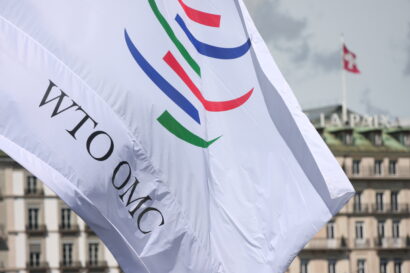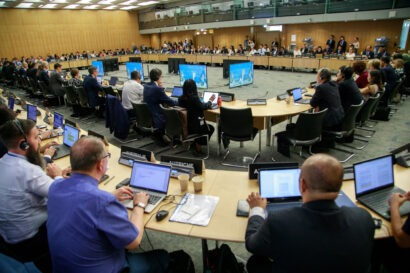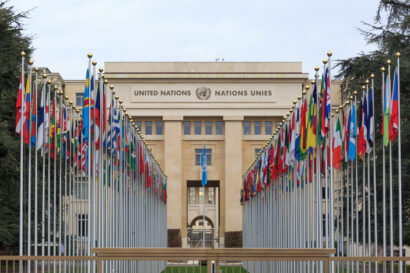I thought not. And, by the way, formulary apportionment is not directly connected to children’s milk food formulae – although more of it in our lives should ensure that more under-nourished babies are better fed. Formulary apportionment is all about taxation of transnational corporations. It is very complex. But the principles are quite straightforward.
The reality of transnational corporations’ cross-trading
Transnational corporations have subsidiary companies in more than one country. Some have them in dozens of countries and some have hundreds of subsidiaries. They inevitably do much of their international business with one another. Unilever does not manufacture its range of foods, beverages, cleaning agents and personal care products separately in each of the many countries in which it operates. Nor does it brand and market completely separately in each country. Its many subsidiaries and affiliates trade with one another across international borders – in market-ready products, in components, in packaging, in management expertise, in the right to use its 400+ separate brands, in intellectual property and in capital (i.e. inter-company loans).
Two possible ways of taxing Unilever Worldwide
How should Unilever Worldwide be taxed? There are two main possible answers. The first and most logical is unitary taxation: Unilever could be taxed on its total worldwide profits, allocated according to the location of its activities. It could present annually to the tax authorities of the countries in which it operates a single set of accounts. These would include profits for the firm as a whole, and identify the proportion of its activities (number of employees and wage bill, assets, and sales) in each country where it does business. Its tax bill could then be apportioned among all those countries according to an internationally agreed formula based on a weighting of these factors. That is formulary apportionment.
The second way of taxing Unilever is to disregard that it is a worldwide entity. In this approach, each subsidiary would report to, and be taxed by the revenue authorities in the country in which it is located. And the parent company would report to the tax authority in the country in which it is formally head-quartered. But there, it would need to report only the income it actually receives from the other parts of the whole Unilever group, usually as dividends. Other income could be transferred through a chain of intermediaries to holding companies in countries where it is not taxable, either because the country has no income or profits tax, or it exempts foreign source income. But Unilever does not have to submit accounts for the whole of Unilever Worldwide to any one tax authority.
The latter is sort-of what happens at present – although tax law is much more complex, and national tax rules vary enormously. What is wrong with the current system? It is not that it is a bit messy. Any system for taxing transnational corporations is likely to be messy. It is rather that the current system disregards the economic reality of Unilever as a worldwide business, and also provides very strong incentives for the managements of transnational corporations to shift their profits around the world through pure accounting devices. It diverts valuable management, accounting and legal skills into gaming the tax man. It is unfair between countries, because some get much less in tax revenue than they have earned by hosting transnational businesses. And it is a major source of business for tax havens, where little or no tax is paid (Palan,R., et al., 2010). If transnational corporations were not using tax havens for this purpose, it would be easier for global authorities to crack down on their more nefarious uses, including money laundering and tax evasion by wealthy individuals.
If we had a system of formulary apportionment, there would be little reason for transnational corporations to put so much effort into shifting profits around the world on paper, and much less incentive to use secret tax havens.
How transnational corporations get around paying taxes
How do transnational corporations less scrupulous than Unilever shift their profits around the world in an accounting sense? Easy. Here are three widely used devices that might be used for example, by a transnational corporation in the business of distilling, brewing and selling alcoholic drinks. First, it might sell its finest scotch whisky at an artificially high price to a retailing subsidiary in a country where it does not want to be seen to be making profits – or at a low price if to wants to show profits. Second, it might charge unreasonably high (or low) rates for subsidiaries for the right to use such famous brand names as Moores Pale Ale for beer they were brewing in-country. Third, it might organise a large number of inter-company loans among its many subsidiaries, charging lower or higher interest rates than those available from local banks, according to the central plan about where profits should finally appear to be ‘earned’.
If you are with me so far, you need to know where the excitement is. A couple of years ago, I would have said that formulary apportionment was pie in the sky. Although over 20 American states actually use such a system to share out income tax from US companies the rest of the world has gone in another direction, and the political resistance from the world’s transnational corporations appeared fierce and apparently insurmountable. But the wind seems to be changing. The European Union is considering introducing such a system internally. A few transnational companies seem to be signalling that formulary apportionment would not be a big problem globally, and would perhaps be a reasonable price to pay for cleaning up their image.
Tax avoidance of international corporations in the UK
And, on Saturday 20 October, responding to the campaign around the alleged failure of Starbucks to pay significant taxes in the UK on its profitable UK activities, an editorial in the Financial Times, one of the world’s leading business newspapers, urged that the European Union proposal for introducing formulary apportionment should be “keenly pursued”.
We are quite some years away from any global adoption of formulary apportionment. But it is worth fighting for.
The governments of many developing countries would get more tax revenue, and could be more realistically held to account for infant under-nutrition, and many other things.
And the bun-fight over the actual formulae through which the global revenues of transnational corporations are allocated among countries offers real opportunities. Instead of giving aid, we might calibrate the system such that the governments of the poorest countries would automatically get a revenue supplement. Even better, we could make that supplement conditional on their running effective direct cash transfer programs for their own poor citizens. We would then have a global welfare state. You will forgive my excitement?



